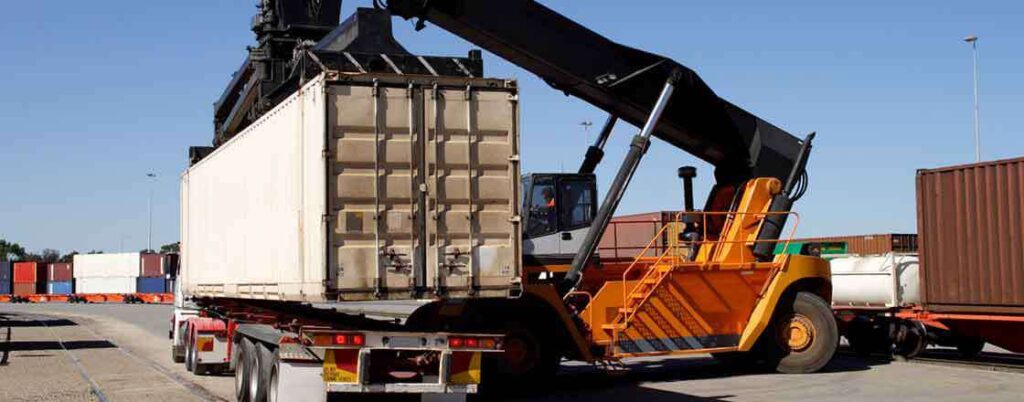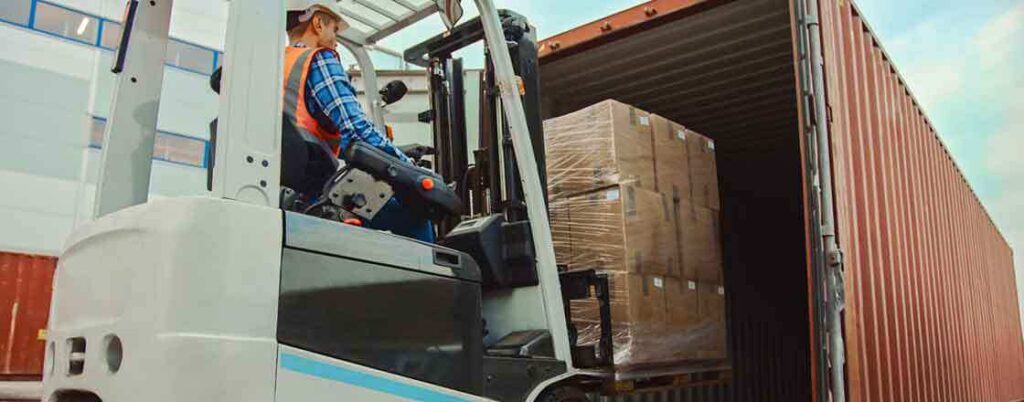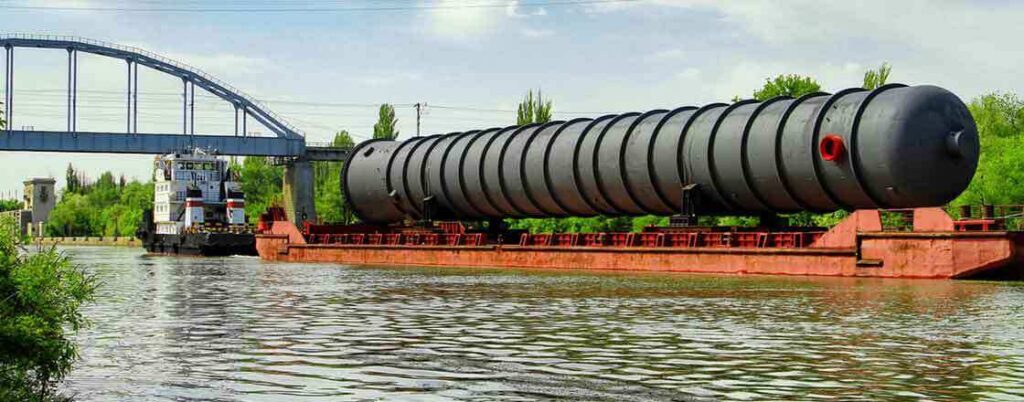A transloading agreement, like any other business contract, needs careful review before signing. By design, transload services can cover many different types of transportation. Rail, truck, plane, or beyond, there is usually a transload service that can cater to it. Even so, it's important to review the legal matters first.
A transloading agreement is a legal contract between a carrier, a shipper, and a transload facility. Shippers may use a freight forwarder to negotiate contracts for them. Transload facilities can be operated by carriers or as independent companies. Contract details will vary by commodity, frequency, and requested services.
Make sure you know what to expect from a transloading contract and avoid being caught in shipping surprises.

Transloading Agreement: Fine Print Services
Companies that need to move large and varied amounts of merchandise are relying more often on transloading services. As a service, it provides a way to keep goods moving, preventing supply bottlenecks from forming.
Transloading facilities can now handle more commodities than ever and can even serve as distribution hubs. A service agreement with specific transload facilities is common and useful in many situations.
Shippers should consider long-form contracts with transload facilities in the following cases.
- Frequent use of specific shipping lanes and routes
- Use of specialized services such as HazMat
- Close proximity to competitive ports
- Frequent cross-border shipping (north or south)
- Shipping agricultural and food-grade commodities
A contract is just another way of developing business relationships. The more complex the business, the better the relationship should be. Commodities that need to be carefully tracked or handled need to go through companies you can trust to handle things professionally.
Before you sign an agreement, it's important to have a working knowledge of items that are likely to pop up in the fine print. Whether the contract is with the transload facility itself or with your preferred carrier, the terms of the agreement need to be clear.

Common Transload Contract Fees
Depending on the mode of transportation and level of handling, transload fees will change. To give you a set price, a transload facility could have a provision in the agreement that sets cargo limits.
Transloading palletized cargo from a marine shipping container to a dry van, for example, isn’t very labor-intensive and can be done by one person with a forklift or pallet jack. If you are providing loose items that need to be palletized or crated for transload, the fees go up.
The key to keeping a good relationship will be to stick to the terms both parties agreed to in the first place. Let’s consider some common terms.
Minimum Volume Commitment
When negotiating contracts with carriers and transload facilities, volume and frequency matter. Someone that can be counted on for regular service and quantities might even get a better rate.
A transload or freight facility that’s giving you a better rate for constant deliveries or volumes is holding you to a Minimum Volume Commitment (MVC) clause.
The exact terms are going to vary but the base principle is the same. A customer agrees to a set volume for however long the agreement is set. It might be divided into months or quarters depending on the business model.
If you don’t hold up your end of the deal, you’re likely to get hit with a shortfall fee. Many of these fees go by weight. The more weight you’re short by, the greater the fee.
For example, say you have an agreement with a facility to transload sand from dump trucks into woven bags. The agreement states that you will ship and store 30,000 pounds of sand each month and be charged $0.20 per pound. Anytime you fail to deliver that amount, a shortfall fee comes into play.
The missing weight is charged the base rate plus the shortfall fee.
Sample Shortfall Fee Rates
| Amount Transloaded | Base Rate per Pound | Shortfall Fee for Missing Weight | Price Paid |
| 30,000 lbs (MVC) | $0.20 | $0.00 per lb | $6,000.00 |
| 24,000 lbs (80%) | $0.20 | $0.10 per lb | $6,600.00 |
| 15,000 lbs (50%) | $0.20 | $0.40 per lb | $9,000.00 |
| 6,000 lbs (20%) | $0.20 | $0.70 per lb | $18,000.00 |
Shortfall fees tend to be calculated in ranges. In the example above, the fee changed based on percentage. A shipper who can get in at least 80% of the MVC is still going to get a decent deal. The fee is small and only applies to the missing weight.
The more weight is missing, the higher the shortfall fee. The above breakdown is a simplified example, but it highlights the importance of upholding mutually agreed terms.
A few pounds of difference in either direction usually won’t make a major impact. In some cases, you might even get overage credit if you are able to transload more than agreed. For industries that vary by season, like agriculture, this is a lifesaver.
Someone transloading corn might have to pay those higher shortfall fees in lean months, but they can make up for it during high output times. At the end of the year, they can hope to balance out.

Demurrage
One of the best selling points for transload services is the ability to keep goods moving. Where one form of transportation stops, another picks up the slack. For best results, this should happen quickly so that facilities can avoid congestion.
A demurrage tariff might get applied if trucks, shipping containers, or railcars aren’t moved or emptied within a set amount of time.
The basic rules for demurrage rates are set by the United States Surface Transportation Board (STB). Ports and railyards follow published tariff rates, so transload facilities at these locations use them as a basis.
Facilities that focus more on truck-to-truck transloading still have demurrage penalties, but they are set by the serving carrier.
Demurrage fees can fluctuate quite a bit in transloading agreements since so many different kinds of transfers are possible. When reviewing your contract, look out for some of the following points.
- Length of “free time”: The length of time a loaded or empty unit can stay at a facility without being charged. Almost every facility will have some kind of grace period, but you shouldn’t count on it being the same everywhere.
- Source of the fee: A fee can be set by the rail company, port, individual carrier, or even by the transload facility. Some of these are controlled by standard tariff rates, but not all.
- Responsible parties: Not all demurrage fees are the fault of the shipper. If a facility has overbooked or gotten behind and the free period has passed, those fees may not be on you. This is especially true in rail transload sites subject to STB demurrage fee rates.
Depending on the transload facility you are working with, these points may or may not be up to negotiation. In either case, it doesn’t hurt to ask. If your freight forwarder is negotiating a transload agreement for you, mention demurrage as a specific negotiating point.
To avoid fees set forth in this section, here are some best practices you can encourage.
- Have digital and paper copies of all required paperwork and permits, especially if crossing state lines or international borders.
- Check in with receiving sites if they are responsible for picking up transloaded materials from the facility directly.
- For loose bulk or out-of-gauge cargo, have accurate weight records and/or measured dimensions.
- Check the local news for inclement weather. Major storms and weather events that can impact shipping are often seasonal and can be planned for.
When it comes to logistics, a little bit of planning goes a long way toward securing services. Even unexpected events are manageable when things are well organized.

Railcar Switching
Transload services specific to intermodal rail services have additional contract points. Railcar switching is the term used to describe how rail cars are moved within a railyard to build or break down trains.
If your transloaded or intermodal shipment needs to switch from one track to another to reach its final destination, there may be a switching fee.
Switching is a common and necessary practice. If a rail tanker of refined petroleum is making its way from North Dakota to a delivery point in Georgia, it may need to change rails a few times. It’s much easier and safer to switch a rail car than it is to transload petroleum from one rail tanker to another.
Whether you get charged a fee or not depends on a few factors.
- The switch might be part of the transload services you are contracting for, so no additional fees would be added on
- If you request the switch to take advantage of a different carrier or route outside of those established by contract, there might be a fee.
- Switching rail cars after they have been fully or partially loaded increases the danger, there might be a fee.
The general rule is that if the switch happens outside of the specified transload area, you need to pay the switching fee to the entity managing the rail itself. Switching fees for movement within the transload area can be negotiated in your contract.

Do Transload Facilities Require Additional Insurance?
Compared to direct shipping, transload does come with some additional risks. Every time cargo is handled at a transfer point, there is an increased risk of damage.
All truckload carriers are required to have minimum liability coverage, usually in the range of $50,000 to $100,000 depending on state and commodities. Liability coverage is the absolute minimum and it does far more to protect the carrier than the shipper.
Shippers can opt to secure additional insurance to provide better coverage in case of damaged freight. This might be offered as all-risk insurance by the carrier or freight forwarder when negotiating contracts. Depending on the liability limits, all-risk insurance may not cover transloading services.
A transload facility operates in much the same way. The standard amount of general liability insurance required by transload facilities is $1 million. It covers possible injury as well as pollution liability in some cases.
Most transload agreements contain a clause requiring clients to provide proof of “adequate insurance coverage” according to need. Each transload facility can determine what adequate coverage is per commodity or provided service.
This may include but is not limited to insurance policies that cover:
- Railroad properties
- Trucks, trailers, railcars, or other equipment used in the transload process
- Personal injury
- Pollution liability
- Worker’s compensation insurance
- Automobile liability
Whether the facility or the customer is responsible for the above, will depend on the drafting of individual contracts.
If there are changes to insurance policies while contracts are in place, provide a written notice at least 30 days beforehand.

Carrier vs Shipper Contract Requirements
The best business contracts are the ones that benefit both parties involved - everyone gets something they want or need. That doesn’t mean everything is always equal - contracts can lean one way or another.
When it comes to insurance, as an example, contracts can be drafted that favor one party over the other in terms of responsibility. There are limited rules governing who has to be responsible so long as someone is picking up the bill.
Much like there are certain fees that shippers can’t avoid, there are contract items that carriers or transload facilities are required to provide.
If your contract is missing these items, there is cause for worry.
Confidentiality Clause
Adequate privacy is a major concern in global and domestic shipping. With the Freedom of Information Act, it became possible for private citizens to request a startling amount of information, even from private companies, so long as there was some connection to government agencies.
For instance, some information on freight comes under the jurisdiction of the STB, a government agency.
All transload agreements should have a clause that protects a company’s confidential information. It doesn’t mean that the company doesn’t have to provide the information, but it does allow it to be redacted from potentially public records and filed with the Securities and Exchange Commission instead.
Information that a company may wish to keep confidential includes:
- Trade secrets
- Proprietary software
- Intellectual property
- Source codes
- Official use of trademarks and logos
The information above, or any other information that you may want to keep confidential, becomes protected from public record. There should also be a statement that extends that confidentiality rule to anyone working with the transload at the time.
If a request is made for confidential information that the facility can’t refuse - like an official government request - the contract requires the transload company to inform you ahead of time.
The level of confidentiality you need or want can be negotiated to a certain point. For example, it may apply only while the contract is active. If it’s important to the well-being of your company, you can also negotiate for extended confidentiality that extends past the service dates.
A three to five-year extension can provide additional protection in cases where a company changes ownership or leadership. Contracts are still legally binding in those situations.

Force Majeure: The Act of God Clause
Tornados. Blizzards. Rogue waves. Earthquakes. Hurricanes. When it comes to the phrase, prepare for the unexpected, this is usually where minds go. For as much as you check the news or track the weather reports, there are some things you just can’t predict.
Force majeure is what most people refer to as an Act of God clause. The inclusion of a force majeure clause is there to protect all parties involved in the contract - shipper, transloader, and carrier.
If the conditions for declaring force majeure have been met, any obligations, other than regularly scheduled payments, owed by the claiming party can be suspended.
Instances that could call for a force majeure claim include (but are not limited to)
- Weather phenomena
- Floods or fires
- Strikes and labor disputes
- Civil disobedience and riots
- Terrorism and warfare
- Mechanical failure or facility damage
- Epidemics
- Unanticipated government actions
Events like the ones above can severely interrupt a business. The length of the interruption varies, so no specific ‘return to normal operations’ timeline is set. Instead, there is usually a line about showing proof of how you are trying to resolve the effects of the force majeure.
Obviously, this is easier said than done, especially for events involving government actions. Either way, it is there to protect everyone involved in the contract. Consider the following possible situations as examples.
- A barge crossing the Gulf with a load of fruits to be transloaded in Tampa, Florida suffers a mechanical failure and has to be abandoned. Without the load, the shipper is unable to meet the MVC of their contract. The shipper is protected from shortfall fees in this case.
- A rail transload facility in California needs to shut down operations because of a wildfire in the area. It had an agreement to transload a grain delivery in the same week. The shipper cannot fault the facility for breach of contract.
- Martial law is declared in the city where the freight forwarder's offices are located and the government has temporarily shut down businesses. Any transactions that the transload facility or shipper was waiting on are placed on hold until communications can resume.
If something happens and you aren’t sure it counts as a force majeure item, you can still try to make the claim. As long as it isn’t specifically excluded in the contract, it’s likely to count.

Finalize the Fine Print With Transload Services USA
Time is money. When you need transloading services to keep your business moving, you want to get through contracts quickly.
Transload Services USA has years of experience in drafting and reviewing all types of commodity transloading. If you need a long-term transloading agreement with one or more facilities, we can help.
Need more than transloading? We offer a variety of services to help with shipping needs. Call today to speak to a representative and ask us about:
Give us a call today at (352) 282-4588 to speak with one of our experienced representatives about your transloading needs. If you need services now, get a direct quote online now and let us know if it's urgent. Someone will be with you shortly.

